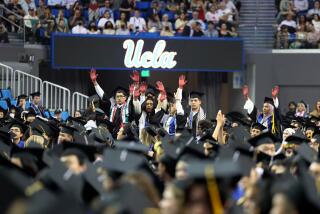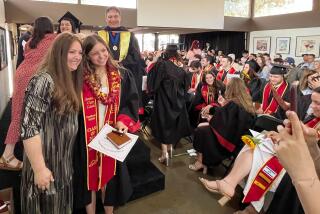UCLA awards honorary degrees to Japanese Americans who were interned
A lifetime ago, the Yamaguchi family labored long and hard in a chop-suey shop in downtown Los Angeles to send their son, Kei, to university, hoping it would give him the chance for a better life.
World War II interrupted the immigrant family’s dreams, but on Saturday, Kei Yamaguchi finally received his degree from UCLA — almost seven decades after he left.
“It feels great,” said the 91-year-old Yamaguchi, who is still active in the family termite-control business.
He was among 48 Japanese Americans who were awarded honorary degrees, some posthumously, in a special ceremony at the Westwood campus.
All were from families forcibly relocated to camps after Japan’s 1941 attack on Pearl Harbor and President Franklin D. Roosevelt’s infamous Executive Order 9066. In one of the darker chapters of U.S. history, more than 110,000 people of Japanese ancestry, most of them U.S. citizens, were interned.
Among those shipped to camps were about 700 University of California students from four campuses, including UCLA. Some ended up earning degrees at other universities; others never returned to college.
Last year, the UC Board of Regents voted to suspend a three-decade ban on awarding honorary degrees in order to recognize the former scholars. Gov. Arnold Schwarzenegger later signed legislation directing the UC system and other post-secondary institutions to confer honorary degrees upon those obliged to abandon their studies during the war.
Some of Saturday’s honorees, including Yamaguchi, were able to attend and donned robes, caps, flower leis and ribbons crafted by current students. Children, grandchildren and other relatives stood in for those who had died or were unable to attend.
A few were in wheelchairs. Many walked slowly, using canes and leaning on loved ones.
But all exuded pride as UCLA Chancellor Gene Block awarded them diplomas during an upbeat ceremony at Schoenberg Hall. Cheers and thunderous applause erupted as each recipient’s name was read aloud.
“It’s been a long time coming. I never thought it would happen,” said honorary graduate Toshio Matsumoto, 87, a retired electrical engineer from Sacramento.
He traced a life arc not uncommon among this group, from UCLA to the camps to a resumption of studies in the Midwest to a stint in the Army and a successful career in private industry. He recalled how his father was forced to sell his grocery store in downtown L.A. for a paltry $500 before the family was whisked away.
“It was very traumatic,” said Matsumoto, who, like others, displayed no rancor.
Yuriko Ito Takenaka, 86, voiced hope that the group’s collective experience would resonate with a younger generation for whom an injustice like forced internment may seem hard to fathom.
“People nowadays don’t think about civil rights,” said Takenaka, who was a freshman at UCLA when her family was interned and who later completed her nursing studies at Stanford University. “They take it all for granted. This is a way to remind people what happened.”
Fumio Robert Naka, 86, who was a UCLA student when he was sent to the Manzanar internment camp in the Owens Valley, said the experience taught a lesson in how humans can persevere when confronted with events “beyond our control.”
Naka, who travelled from his home in Massachusetts and delivered the honoree address, eventually earned a doctorate from Harvard and became an acclaimed electrical engineer. He worked on radar technology for the U.S. government, much of it top secret, and recalled how his former boss once said to him: “You’ve gone from being a distrusted American to one of the most trusted Americans.”
There were also bittersweet moments for the loved ones of those who have died.
“This feels wonderful, but sad at the same time,” said Kerry Cababa, whose late mother, Masa Fujioka, was among those honored. “My mother would have loved to have been here. She was always a big UCLA booster.”
More to Read
Sign up for Essential California
The most important California stories and recommendations in your inbox every morning.
You may occasionally receive promotional content from the Los Angeles Times.










